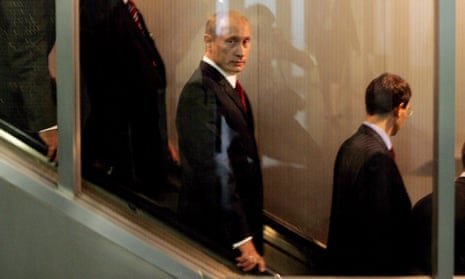It promises to be a rhetorical battle of the titans, on a scale not seen for at least a decade. On a Monday morning in late September, Barack Obama, Vladimir Putin, Hassan Rouhani, Xi Jinping and François Hollande are all scheduled to deliver speeches at the United Nations in New York, setting out their visions of the geopolitical landscape at the outset of a highly uncertain era.
The vagaries of the timetable at the general assembly meeting marking the 70th anniversary of the UN mean all five leaders will be addressing the chamber within the space of a couple of highly charged hours. Putin’s plans to attend for the first time in a decade has added spice. It will also be Xi’s general assembly debut.
It will be the first joint appearance on a public stage of Obama and Rouhani since the Iran nuclear deal agreed this month in Vienna, and there is great anticipation that the two presidents could meet for the first time. Last year they spoke by phone as Rouhani was leaving town. On this occasion, by the time the presidents mount the famous green marble podium, the US Congress is expected to have voted to reject the Vienna agreement, and Obama could be in the position of counting votes in a scramble to ensure he can sustain a presidential veto of the congressional vote. The domestic politics around an Obama-Rouhani meeting could once more prove awkward.
Before 2013, the greatest tensions in the UN chamber were provided by Rouhani’s mercurial predecessor Mahmoud Ahmadinejad. This September, Russia’s combative president, speaking an hour after Obama, is the most likely to provide rhetorical fireworks. Putin’s office has not confirmed his participation but has said preparations are under way for him to attend. He will be on the defensive in the face of widespread censure at the UN over Russia’s annexation of Crimea, its military role in eastern Ukraine and the downing of flight MH17. Putin’s tone and choice of words will be closely scrutinised for signs of conciliation or a further drift towards cold war-style animosity.
“The wild card will be Putin. Will he play the role of the great dealmaker who supported the Iran agreement, or will he be in all-out anti-American mode?” Richard Gowan, a UN expert at the European Council on Foreign Relations thinktank, said.
“Obama will be in the tricky position of speaking before his two main geopolitical rivals. If he lauds their cooperation over Iran, rightwing American critics will claim he’s gone soft on China and Russia. If he throws in any tough lines about Ukraine, as he did last year, or the South China Sea, Xi and Putin will be able to take the podium and accuse him of making trouble.
“I can only imagine that the [US] State Department will be trying to coordinate very closely with Moscow and Beijing, and the CIA will be working very hard to get early drafts of their texts,” Gowan said.
The last time there was a lineup of such powerful figures at the UN was at its 60th anniversary world summit in 2005. George Bush and Tony Blair were then the leaders under pressure because of the disastrous invasion of Iraq two years before. Xi’s predecessor Hu Jintao spoke for China, and then French prime minister, Dominique de Villepin, stood in for his president, Jacques Chirac. Putin was there in his first presidency. He is the only global leader at that summit still in power a decade later.
British PM David Cameron is expected to be in New York on the opening day, for meetings with other leaders on the margins of the general debate, but he may duck out of the Tuesday night speech, leaving it to this foreign secretary, Philip Hammond. Cameron’s office has yet to announce its plans.
The provisional running order is subject to change, but is set largely according to protocol, with heads of states taking precedence over heads of government, who speak before mere ministers. By a quirk of UN history, having chaired the first general debate, Brazil always gets to speak first on the opening morning of the general debate, followed by the US as the hosts. The current UK slot is just before 9pm EST (1am GMT) on Tuesday29 September, when the UN chamber will be exhausted from listening to speeches from Uruguay, Lithuania, Seychelles, Czech Republic, Tanzania and leaders of 13 other countries.
This article includes content provided by Google. We ask for your permission before anything is loaded, as they may be using cookies and other technologies. To view this content, click 'Allow and continue'.
